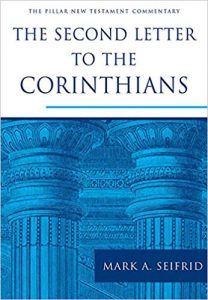Mark A. Seifrid is the author of the 2 Corinthians commentary in the Pillar New Testament commentary series. He is professor of exegetical theology at Concordia Seminary, St. Louis, Missouri. Dr. Seifrid has been the Ernest and Mildred Hogan professor of New Testament interpretation at Southern Baptist Theological Seminary in Louisville, Kentucky. He is a graduate of Trinity Evangelical Divinity School, Deerfield, Illinois and he received his Ph.D. from Princeton Theological Seminary in 1990.
Dr. Seifrid’s books include, Justification by Faith: The Origin and Development of a Central Pauline Theme (1992), Christ, Our Righteousness: Paul’s Theology of Justification (2000), and Justification And Variegated Nomism: Volumes I and II, with D.A. Carson and Peter T. O’Brien (2001, 2004).
7 Questions on 2 Corinthians in the Pillar Commentary Series
 Recently, Dr. Seifrid kindly answered my questions about his 2 Corinthians commentary. Readers will learn how this commentary came to be, what is unique about it among 2 Corinthians’ commentaries, and how the project edified him personally.
Recently, Dr. Seifrid kindly answered my questions about his 2 Corinthians commentary. Readers will learn how this commentary came to be, what is unique about it among 2 Corinthians’ commentaries, and how the project edified him personally.
1. What previous research and/or personal interests led you to this project and helped prepare you to write this commentary on 2 Corinthians?
I have had an interest in Paul, his message, and its relevance for us today for a very long time. Second Corinthians receives less attention than Romans, Galatians, and even First Corinthians. But its message concerning the “word of the cross” and the nature of Christian life speaks directly and powerfully to contemporary Christianity.
2. Who is the intended audience for this commentary? Would it benefit pastors? professors? students? lay Christians in the local church?
The target audience includes any and all who are interested in listening to the message of Scripture with close attention to the biblical text. I had pastors and their needs in mind as I wrote, but also interested laity. It will speak, I think, to the scholarly community as well.
3. What is unique about this commentary? What contribution does it make to studies of 2 Corinthians?
I have attempted to hear Second Corinthians as a “word on target” (Beker), addressing the needs of the Corinthian church after a long and contentious relationship with Paul. The letter is to be read and understood as a whole — and furthermore as the theological complement to First Corinthians where the question of the marks of an apostle and the marks of a Christian likewise stand at the center of the contention. Once the center of the conflict becomes clear, the relevance of the message of Christ’s power hidden within weakness and suffering becomes clear.
4. What section or passage of this commentary was particularly memorable to research and write? Why?
I suppose that I would have to say Second Corinthians 3, the contrast between Paul and Moses, the ministry of life and that of death. Its relevance for the interpretation of the entire letter should not be underestimated: God gives life only where he has put to death. That is the message of the crucified and risen Christ.
5. What personally edified you in writing this commentary, increasing your affections for Christ?
The fresh discovery of comfort in Christ, sufficient for living and dying.
6. Besides your commentary, what are your top recommended books (commentaries or otherwise) on 2 Corinthians?
I found Ulrich Heckel’s Kraft in Schwachheit (Power in Weakness) especially helpful (although that is only in German). I still like Furnish in the Anchor Bible series. Frank Matera [New Testament Library series] should not be overlooked.
7. What’s next for you? What project are you currently working on? How can people follow your work and ministry?
I am currently working on a commentary on Galatians. Aside from googling my publications, the best way to keep track of what I am doing would be to visit the Concordia, St. Louis website.
Own Mark A. Seifrid’s 2 Corinthians commentary
The link provided will direct you to this volume via it’s exact ISBN number:
- Get Dr. Seifrid’s commentary on 2 Corinthians at Amazon
- Get Dr. Seifrid’s commentary on 2 Corinthians on Christian Book Distributors
Recent Posts
David Jeremiah, a renowned pastor, author, and speaker, has captivated the hearts of many with his compelling sermons. His messages resonate deeply with diverse audiences, leaving an enduring...
Tim Keller, a distinguished pastor, theologian, and author, has garnered a devoted following through the profound impact of his sermons. In this article, we will explore seven compelling reasons...
